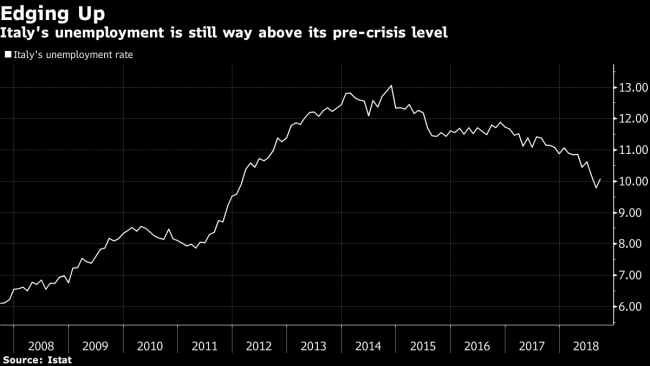(Bloomberg) -- Italy’s central bank governor and finance minister publicly sparred over the populist government’s plan to solve Italy’s chronic low growth by boosting spending.
“The growth divide between Italy and the rest of the euro area is a structural problem that can’t be solved by monetary stabilization policies or by expanding the government’s budget,” Bank of Italy Governor Ignazio Visco said in Rome on Wednesday.
Finance minister Giovanni Tria, who spoke shortly after Visco at the same event, retorted that his government’s deficit-spending plans are aimed at “reducing the nation’s economic growth gap with the rest of Europe.”
Recent economic data highlight the country’s economic difficulties. The national statistics agency said Wednesday that the unemployment rate was 10.1 percent last month, 2 percentage points over the euro area as a whole, a day after saying the Italian economy stalled in the third quarter.
The back-and-forth highlights how the standoff over Premier Giuseppe Conte’s first budget law is becoming entrenched even within Italy. The European Union has already rejected the plan and investors have signaled their skepticism by pushing higher the yields on Italy’s large government-debt pile.
Tria -- who was plucked from academia to head the finance ministry in the populist government -- insisted that fiscal stimulus is necessary to get the economy moving again, even more so after growth stalled. The government has two weeks to send the EU a revised budget but so far signaled no intention of backing down.
“Economically and socially, we cannot afford the cost of a no-deficit policy,” he said. “We are convinced that the budget law deficit level is not only sustainable, but also responsible.”
In his speech, Tria stressed that rising yields are the consequence of political uncertainty and not of deteriorating fundamentals.
The slowdown in the economy comes after months of rising borrowing costs fueled concerns about Italy’s ability to repay its debts. Visco, who also sits on the Governing Council of the European Central Bank, stressed that the nation’s debt is sustainable.
“But there must be a clear commitment to keeping it that way," he said. That means "putting the debt-to-GDP ratio on a credible path of long-term reduction.”
Euro Doubts
That the commitment must be “credible” is a key point. The government’s forecast for 1.5 percent growth in 2019 is seen by economists as excessively optimistic. If the expansion were to be slower than expected, the extra spending Tria has planned would set Italy’s debt on an upward path.
“I am sure the debt will fall, because we are spending more on investment, above all on investment in human capital,” Deputy Premier Luigi di Maio from the Five Star Movement said on Wednesday.
Yet Visco said the surge in Italian borrowing costs since the populist coalition took power, if not reabsorbed soon, will cost the state more than 5 billion euros ($5.7 billion) next year. It is also weighing on banks’ funding and is pushing up borrowing costs for companies and households.
Intesa Sanpaolo (MI:ISP) SpA chief Carlo Messina said he’s not concerned about the impact of Italy’s falling bond values, seeing “absolutely” no sign of depositor flight from banks. Shares in Italian banks have plummeted in recent weeks, as the depreciation of Italian bonds poses a risk to the capital of lenders, which hold much more of their government’s debt than their peers in any other European country.
He called on officials to end all doubts about the government’s commitment to stay in the euro as a first step to bring down bond yields.
“Uncertainty adds to volatility in financial markets,” he said.
